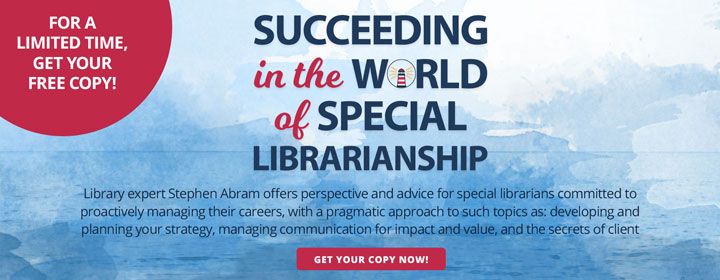Learning Styles: The Basics for Special Librarians
I’ve learned many things over my over 40 years as a librarian. That said, we don’t, as professionals, sufficiently embed learning at the core of our practice.
Here’s why I think that:
- We care about information. Information is wonderful! But it’s insufficient for us to only consider information alone. How does information become knowledge? That’s the key question.
- Information becomes knowledge through a process called ‘learning’. We often call this education but, even in the education field, the focus shifted years ago to learning and the learner experience. Indeed, ‘education’ frames as something you do for someone while ‘learning’ is an experience that we often do for ourselves.
- While we focus on reading, we know it just doesn’t capture the whole range of ways that people adapt experiences to create knowledge.
- What makes people great is their own individual takes on knowledge. We live in communities, institutions, businesses, associations, and more contexts than I can list here. That’s because we can’t successfully live and thrive as humans without interacting with other humans. We make lousy hermits!
- Learning is the magic that happens between information and knowledge and is a necessary precursor to the behavioural application of knowledge in decision-making and work.
So, what are the dimensions of learning? A group of great behavioral and learning theorists (Piaget, Bloom, Gardner, etc.) posited that there are multiple intelligences and seven learning styles. These are:
- Visual/Spatial (Picture Smart)
- Verbal/Linguistic (Word Smart)
- Musical/Rhythmic (Music Smart)
- Logical/Mathematical (Number Smart)
- Bodily/Kinesthetic (Body Smart)
- Interpersonal (People Smart)
- Intrapersonal (Self Smart)
Occasionally someone will challenge this theory but I believe it. I believe it even more now that the human genome project is finding the genes that are the foundation of the behavioral genome. Gene cohorts that are tied to introversion/extroversion, musical ability, and more, are now being discovered. Indeed, Lady Gaga is right that we are Born This Way.
How does this play out in librarianship?
Why yes, some people are drawn to the accounting and MBA professions because they’re more comfortable with numbers. The same comfort rule applies to literature majors as distinct from science majors. Indeed, I suspect that engaging too many people with the same thinking preference makes for poorer decision-making. Many organizations seek to diversify their thinking styles by building cross-functional teams.
The friction I’ve encountered between marketing pros and IT development pros is an interesting challenge. Indeed, sometimes we have to be multilingual in English— speaking librarian, management, IT geek, and sometimes just plain heartfelt English. Imagine how these skills play out in decision-making situations. Consider how to build your interface (e.g., intranets, websites, and services) to respect the thinking styles evident in your users. You may have a dominant thinking style (such as is common in law firms, R&D, IT shops, audit firms) or a diverse range of thinking styles (such as in students, public settings, retail, and more).
Sometimes, in order to succeed, you actually need to have simultaneous complementary and contradicting styles (artists and IT folks in video-gaming for example). None of this is to say that each individual doesn’t have a matrix of hereditary and experience or training-based skills. It’s just that many people have a preferred style and need to be reminded to use the other ones in their toolkit.
For example, here’s a short toolkit that supports the formal learning process. Which ones do you employ in service and product development?
- Mathematical logical thinking skills – Math and Arithmetic
- Scientific method – Sciences
- Criticism, interpretation and comprehension – English and Languages
- Analytical thinking – History, Geography
- Interpretive and imaginative- Music, Art and Physical Education
- Inter- and Intrapersonal skills – Religion, Guidance, etc.
Obviously, difficult and emotional personnel issues require a different set of skills than document delivery. However, how do you deliver the trusted, most authoritative document when the user is stressed, time pressured, and not bringing their best self to the moment? Consider the difference between when this transaction is in-person versus virtual roles and experiences.
There is an imperative for people to develop lifelong learning skills—a personal learning strategy.
-Stephen

Stephen Abram
Stephen Abram is a popular Lucidea Webinars presenter and consultant. He is the past president of SLA, and the Canadian and Ontario Library Associations. He is the CEO of Lighthouse Consulting and the executive director of the Federation of Ontario Public Libraries. He also blogs personally at Stephen’s Lighthouse. Check out his book from Lucidea Press, Succeeding in the World of Special Librarianship!
Similar Posts
Growing Your Leadership Skills: 7 Tips for Special Librarians
Great library leaders aren’t born—they’re made through learning self-reflection and practice. Here are seven strategies to help you grow and lead with impact.
Keeping Up with Copyright and Generative AI: What Special Librarians Need to Know
As generative AI becomes more prevalent copyright law is evolving to address its impact. A new report from the U.S. Copyright Office provides guidance on what is (and isn’t) copyrightable.
Understanding Shadow AI: Risks Costs and Governance
AI can enhance search discovery and efficiency but unsanctioned adoption—known as “shadow AI”—can lead to budget overruns and compliance risks. Here’s how to evaluate AI pricing models and build a governance strategy that balances innovation with cost control.
Interview with an Author: Fernandez on Streaming Video Collection Development
As demand for streaming video in libraries grows so do the challenges of managing access budgets and licensing. Co-author Michael Fernandez shares key insights from his book “Streaming Video Collection Development and Management”.







Leave a Comment
Comments are reviewed and must adhere to our comments policy.
0 Comments